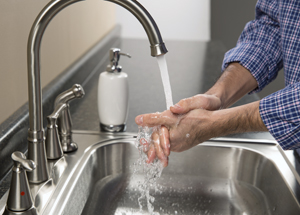Interstitial Lung Disease: Preventing Lung Infections
Interstitial Lung Disease: Preventing Lung Infections
Interstitial lung disease is a group of conditions with inflammation and scarring around the tiny air sacs (alveoli) in the lungs. The changes make it hard to take in oxygen. Often the cause is unknown. This is called idiopathic pulmonary fibrosis. Known causes are conditions like sarcoidosis and rheumatoid arthritis. Breathing in certain substances like mold fungus, or asbestos are also known causes. Some medicines and radiation treatments can also cause interstitial lung disease.
When you have interstitial lung disease, you're more likely to develop lung infections. Do what you can to prevent infections. And get prompt treatment at the first sign of illness.
Prevent infection
Wash hands often.
Use soap and warm water.
If soap and water are not available, use a hand cleaner with alcohol in it.
Don't touch your face and mouth with your hands.
Use disposable tissues instead of a handkerchief. Throw away used tissues.
Stay away from people who have a cold or the flu.
Try to stay away from crowded places.
Get vaccinated
Talk with your healthcare provider about vaccines.
Get a flu vaccine every year as soon as it's available in your area. The flu shot helps prevent you from getting the flu and complications of the flu, such as pneumonia.
Get pneumococcal pneumonia vaccines, as advised by your healthcare provider.
Take care of your body
Drink plenty of water to keep yourself hydrated.
Eat well-balanced, nutritious meals.
Don't drink alcohol.
Don't smoke. Stay away from places where people are smoking.
Ask your healthcare provider what type of activity is best for you. Walking is often a good choice.
Get enough rest. Sleep at least 8 hours each night. Rest or nap during the day as needed.
When to call your healthcare provider
If you start to get sick, call your healthcare provider. If you have severe symptoms, call 911 or go to your hospital's emergency department. Symptoms to watch for include:
Increased shortness of breath with normal activities
A fever of 100.4°F (38°C) or higher, or as directed by your healthcare provider
Increased coughing or coughing up dark or bloody mucus
Increased fatigue
Chest tightness or wheezing
Chest pain
Ankle swelling or rapid weight gain
Updated:
September 03, 2017
Reviewed By:
Blaivas, Allen, J., DO,Image reviewed by StayWell art team.,Sather, Rita, RN
